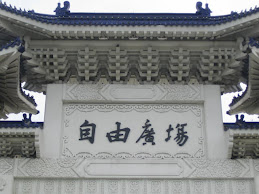 CHIAYI,Taiwan--Even though Ma hasn't officially taken office yet, there's already been several changes (or talk of changes). So keeping in mind Ma's platform of improving the economy, let's take a look at what's been reported so far (in chronological order):
CHIAYI,Taiwan--Even though Ma hasn't officially taken office yet, there's already been several changes (or talk of changes). So keeping in mind Ma's platform of improving the economy, let's take a look at what's been reported so far (in chronological order):Plans to change "Taiwan" on stamps back to "ROC"
This is hardly surprising, considering his vow to change it back, but it is ironic since he kept saying he was "Taiwanese" before the election. It also has nothing to do with the economy.
I guess when he said "immediately", he meant "after I attempt to eradicate Taiwanese identity/nationalism".
Raise gas prices
Previously, gas prices were frozen (an act the KMT promoted before the election). However post-election, KMT officials claimed, "oil companies are losing money and will go bankrupt within a month".
It's been a month since this was reported and there's no sign of bankruptcy.
According to one source, they have more to gain by selling it to other countries. Basically they'd make more money by exporting it than selling it to people in Taiwan.
Build a new White House in a new location
This is proposed by Ma himself -- apparently the old one has too much history because it was built by the Japanese. The new location is pretty far and remote from the other governmental offices, so it will be inconvenient unless you move all of those buildings too.
How does this affect the economy? Let's see -- first buy up massive chunks of land (NT: 1.5mil-1.8mil/acre), then spend several years planning/building.
Where is the money coming from? I can only assume it will be from taxpayers.
I'm sure the project will benefit big construction companies though.
 i-Taiwan 12 projects
i-Taiwan 12 projectsHere's a link to the poster he made. First of all, it's interesting to note that he includes figures for 8 years. Second thing I noted is that of the 12 projects, only 1 does not involve construction in some way.
That one project (8) is for farmers, and outlines money allocated to farmers as well as an organizational system to determine which lands are "not useful", so that they can be given up to the government for other purposes.
Unfortunately the poster does not include implementation methods, and I was unable to find separate explanations. It seems that it's mostly a plan to beautify Taiwan by building stuff and making them tourist spots.
All these building projects lead me to wonder how all of this will be financed. I found one article where Ma vows not to raise taxes (aside from 3 categories: tourism, health, and finance).
From my impression of the projects, most of them can fit under tourism, health, or finance in some way.
So instead of lying outright, he says he won't raise taxes except for x,y,z, where {x,y,z} = {set of all possible categories which need money}. Very clever.
Maybe I need to buy Ma's dictionary because his definition of working on the economy seems to mean, get rid of Taiwanese nationalism, raise costs on necessities (such as gas/oil), start multiple construction projects, take land from farmers, and raise taxes.






